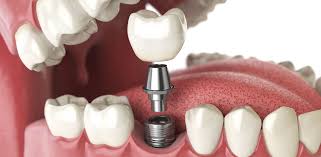Dental implants have become a game-changer in the world of dentistry, offering a permanent solution to the age-old problem of missing teeth. Whether you lost a tooth due to injury, decay, or some other dental woe, dental implants can bring back your winning smile. In this comprehensive guide, we’ll walk you through everything you need to know about getting dental implants.

What Are Dental Implants?
Let’s start with the basics. Dental implants from the likes of https://allonfour.com are artificial tooth roots made of titanium that are surgically placed into the jawbone beneath your gums. These metal anchors provide a sturdy foundation for replacement teeth, whether it’s a single crown, a bridge, or even a full set of dentures.
Why Choose Dental Implants?
Natural Look and Feel:
Dental implants look and feel like your natural teeth. No awkward moments or uncomfortable sensations when you speak or eat.
Long-lasting Solution:
Unlike some traditional tooth replacement options, dental implants can last a lifetime with proper care. They’re not just a quick fix; they’re an investment in your oral health.
Preserve Jawbone Structure:
When you lose a tooth, the jawbone can start to deteriorate over time. Dental implants stimulate bone growth and prevent this from happening.
No More Slipping:
Forget about the hassles of removable dentures. Dental implants stay securely in place, allowing you to enjoy life without constantly worrying about your teeth shifting.
The Dental Implant Process
Getting dental implants is a multi-step process, but the payoff is well worth the journey.
1. Initial Consultation:
Your first step is to consult with a qualified dentist or oral surgeon. They will evaluate your oral health, take X-rays, and discuss your options.
2. Surgical Placement:
If you’re a good candidate, the next step is the surgical placement of the implant into your jawbone. Don’t worry; you’ll be comfortably numb during the procedure.
3. Healing and Osseointegration:
After the implant is in place, a healing period begins. During this time, the implant fuses with the jawbone in a process called osseointegration. This is crucial for the stability of the implant.
4. Abutment Placement:
Once healed, an abutment is attached to the implant. This small connector post will eventually support the new tooth.
5. Crown Installation:
The final step involves attaching the custom-made crown to the abutment. Your new tooth is now ready to shine!
Is Everyone a Candidate for Dental Implants?
While dental implants are an excellent option for many, not everyone is an ideal candidate. Factors like overall health, jawbone density, and oral hygiene play a role. However, advancements in implant technology and techniques have expanded the pool of potential candidates.
What About the Cost?
It’s no secret that dental work can hit the wallet, but the long-term benefits of implants often outweigh the initial investment. Costs vary based on factors like the number of implants needed and additional procedures required. Keep in mind that some dental insurance plans may cover part of the expense.
Caring for Your Dental Implants
Your new teeth need proper care to ensure they stay in top-notch condition. Fortunately, caring for dental implants is similar to caring for natural teeth:
1. Gentle Cleaning Techniques:
While regular brushing and flossing are essential, adopt gentle cleaning techniques. Consider using a soft-bristle toothbrush to avoid unnecessary abrasion on the implant surface. Gentle, circular motions during brushing will effectively clean your teeth and implants without causing damage.
2. Non-Alcoholic Mouthwash:
Incorporate a non-alcoholic, antibacterial mouthwash into your oral care routine. This helps reduce bacteria in your mouth, promoting a healthy environment for your implants. Check with your dentist for recommendations tailored to your specific needs.
3. Interdental Brushes:
Invest in interdental brushes to clean the spaces between your implants and natural teeth. These small brushes are excellent for reaching areas that traditional floss might miss, providing comprehensive oral hygiene.
4. Avoid Tobacco Products:
If you’re a smoker, consider this an extra incentive to quit. Smoking can contribute to implant failure by inhibiting proper healing. Kicking the habit not only benefits your overall health but also enhances the longevity of your dental implants.
5. Balanced Diet for Oral Health:
Maintain a balanced diet rich in vitamins and minerals. A nutritious diet supports overall oral health and aids in the healing and maintenance of your dental implants. Calcium and vitamin D are particularly crucial for strong teeth and bones.
6. Stay Hydrated:
Adequate hydration is vital for general health and specifically important for oral health. Water helps flush away food particles and bacteria, preventing potential issues around your implants. Aim to drink plenty of water throughout the day.
Final Thoughts: Rediscovering Your Smile
Dental implants offer more than just a replacement for missing teeth; they provide a renewed sense of confidence and freedom. The journey to a restored smile might involve a few steps, but the result is a lifetime of natural-looking teeth that feel just like your own. If you’re considering dental implants, consult with your dentist to explore this transformative option and rediscover the joy of smiling without reservations.



